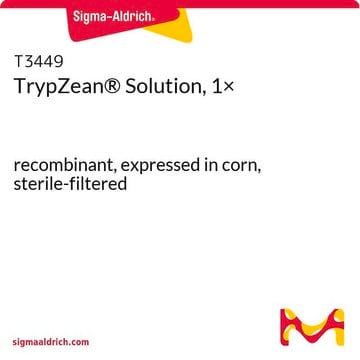T2601
Disolución de tripsina-EDTA
1X, sterile-filtered, BioReagent, suitable for cell culture, 0.5 g porcine trypsin and 0.2 g EDTA, 4Na per liter of Hanks′ Balanced Salt Solution with phenol red
Sinónimos:
Trypsin-EDTA solution
About This Item
Productos recomendados
Quality Level
sterility
sterile-filtered
product line
BioReagent
concentration
1X
technique(s)
cell culture | mammalian: suitable
shipped in
wet ice
storage temp.
2-8°C
¿Está buscando productos similares? Visita Guía de comparación de productos
General description
Application
Biochem/physiol Actions
Features and Benefits
- Save Time - no more freeze or thaw cycles
- Save Space - store at 2-8°C and free up your freezer
- Does not need to be aliquoted
- Only the best for your cells - manufactured in GMP environment
Preparation Note
Storage and Stability
Legal Information
Storage Class
12 - Non Combustible Liquids
wgk_germany
WGK 1
flash_point_f
Not applicable
flash_point_c
Not applicable
Certificados de análisis (COA)
Busque Certificados de análisis (COA) introduciendo el número de lote del producto. Los números de lote se encuentran en la etiqueta del producto después de las palabras «Lot» o «Batch»
¿Ya tiene este producto?
Encuentre la documentación para los productos que ha comprado recientemente en la Biblioteca de documentos.
Los clientes también vieron
Artículos
Use of MULTI-seq lipid-modified oligos, protocol, and troubleshooting guide for PCR Assays and Sequencing applications.
Use of MULTI-seq lipid-modified oligos, protocol, and troubleshooting guide for PCR Assays and Sequencing applications.
Use of MULTI-seq lipid-modified oligos, protocol, and troubleshooting guide for PCR Assays and Sequencing applications.
Use of MULTI-seq lipid-modified oligos, protocol, and troubleshooting guide for PCR Assays and Sequencing applications.
Protocolos
StableCell™ Trypsin solutions are designed to perform cell detachment as standard trypsin solutions do, without the need to aliquot, freeze, and thaw. This saves significant time before passaging.
Contenido relacionado
Discover our primary human intrahepatic biliary epithelial cells, also known as cholangiocytes. Explore our plating and maintenance media formulations and protocol for culture.
Discover our primary human intrahepatic biliary epithelial cells, also known as cholangiocytes. Explore our plating and maintenance media formulations and protocol for culture.
Discover our primary human intrahepatic biliary epithelial cells, also known as cholangiocytes. Explore our plating and maintenance media formulations and protocol for culture.
Discover our primary human intrahepatic biliary epithelial cells, also known as cholangiocytes. Explore our plating and maintenance media formulations and protocol for culture.
Nuestro equipo de científicos tiene experiencia en todas las áreas de investigación: Ciencias de la vida, Ciencia de los materiales, Síntesis química, Cromatografía, Analítica y muchas otras.
Póngase en contacto con el Servicio técnico






